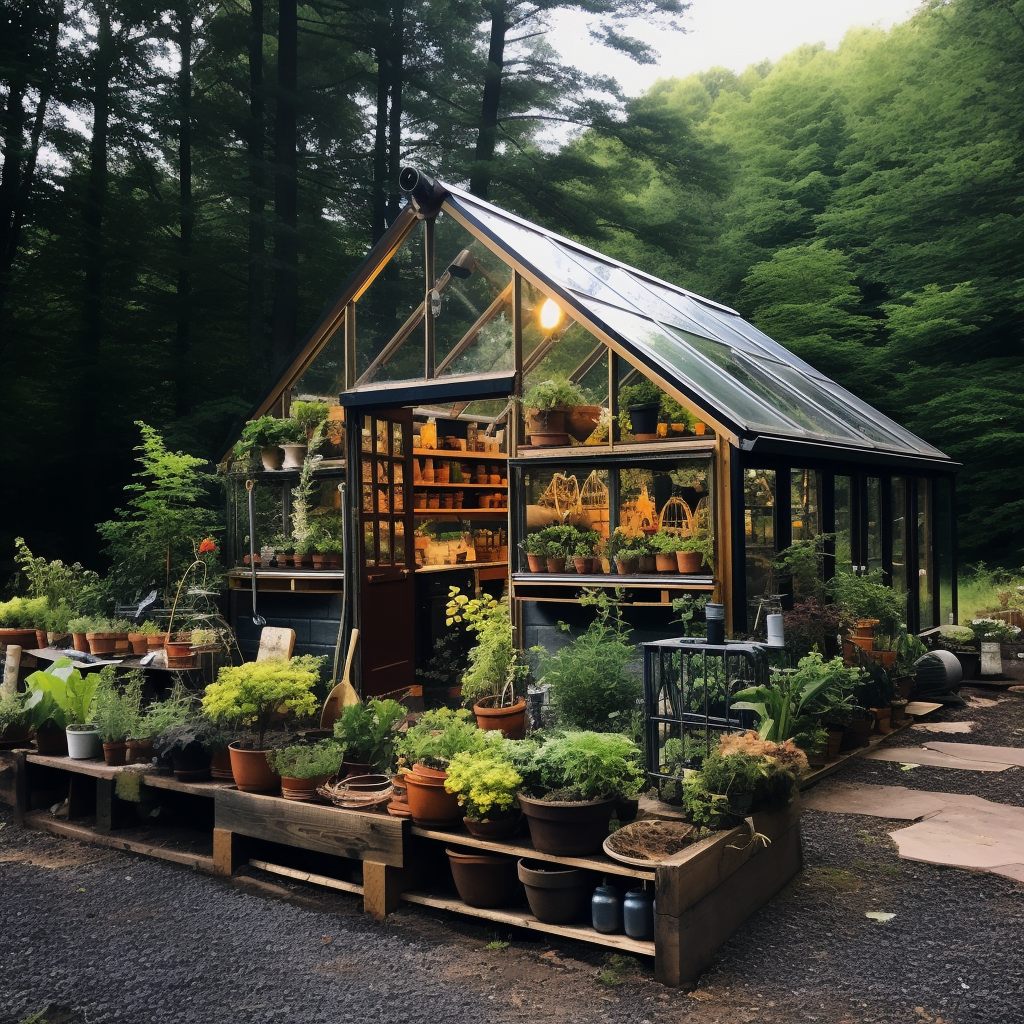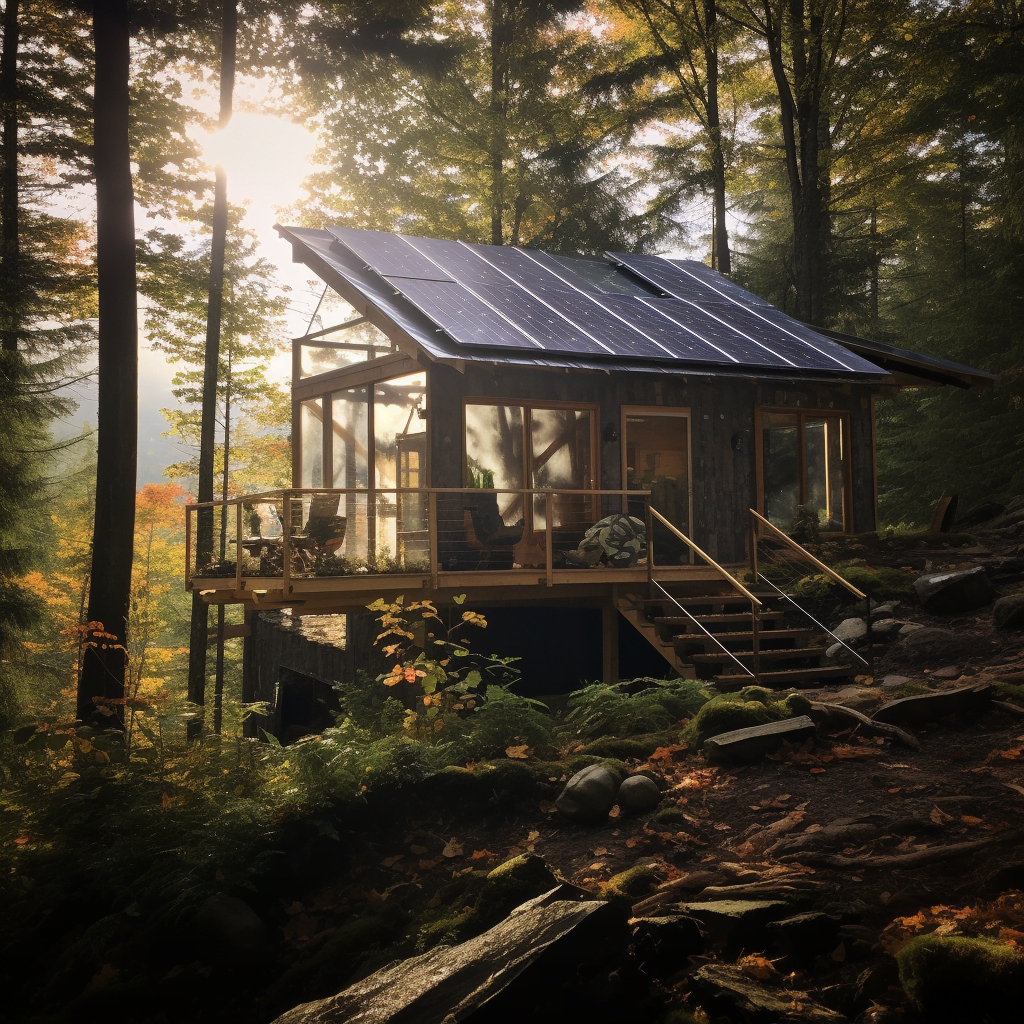Do you ever wonder what it would be like to live off the grid? That means living without relying on things like electricity or running water. It might sound like a big change, but it’s actually a really cool way to live! In this article, you’re going to learn all about off-grid living and how you can do it in a way that’s good for the Earth and for the people around you.
So, let’s talk about off-grid living. This means living in a way that is not connected to the public utility systems, like the electrical grid or the water supply. Instead, you find your own sustainable solutions for things like powering your home and getting clean water. It can be a big adventure, but it’s also a really great way to live a more environmentally friendly lifestyle. In the next paragraphs, we’ll dive deeper into ethical off-grid living and all the cool things you can do to make it happen. Are you ready? Let’s go!

Sustainable Solutions for Ethical Off-Grid Living
Living off-grid has become a popular choice for those seeking a more sustainable and self-reliant lifestyle. By disconnecting from traditional energy and water systems, individuals can reduce their environmental impact and promote a more ethical way of living. In this article, we will explore the importance of sustainable solutions for ethical off-grid living and delve into various aspects of this lifestyle.
Understanding Off-Grid Living
Off-grid living refers to a lifestyle in which individuals or communities are self-sufficient and do not rely on public utilities such as electricity and water supply. Instead, they generate their own energy and manage their own water sources. This way of living allows individuals to lessen their dependence on fossil fuels and reduce their carbon footprint.
Exploring the Ethics of Off-Grid Living
Ethical off-grid living encompasses a set of values and principles centered around sustainability, self-reliance, and respect for the environment. By choosing to live off-grid, individuals are actively promoting sustainable practices, reducing their impact on the Earth, and preserving natural resources for future generations.
Benefits of Ethical Off-Grid Living
Reducing Environmental Impact
One of the primary advantages of ethical off-grid living is the significant reduction in environmental impact. By harnessing sustainable energy sources and adopting eco-friendly habits, such as managing waste and conserving water, individuals can minimize their carbon footprint. This ensures a healthier planet for all and contributes to the protection of natural habitats and wildlife.
Promoting Self-Reliance
Living off-grid allows individuals to become more self-reliant. By generating their own energy, growing their own food, and managing their own water sources, individuals can develop valuable skills and reduce their dependence on external systems. This sense of self-sufficiency fosters a sense of empowerment and resilience, while also providing a sustainable solution for the challenges of modern living.
Fostering a Connection with Nature
Living off-grid often means living in closer proximity to nature. Individuals have the opportunity to immerse themselves in the natural world, appreciating its beauty and gaining a deeper understanding of its importance. This connection with nature can inspire a profound sense of awe and gratitude, reinforcing the ethical values associated with off-grid living.
Sustainable Energy Sources for Off-Grid Living
Solar Power Systems
Solar power is a clean and renewable energy source that can be harnessed for off-grid living. By installing solar panels, individuals can capture the energy from the sun and convert it into electricity. Solar power systems are efficient, eco-friendly, and can provide ample energy for daily needs, including powering appliances, lighting, and heating.
Wind Turbines
Wind turbines are another sustainable energy option for off-grid living. By harnessing the power of the wind, individuals can generate electricity to meet their energy needs. Wind turbines are particularly suitable for locations with consistent wind patterns and can provide a reliable and renewable source of energy throughout the year.
Hydroelectric Power
For those living near water sources such as rivers or streams, hydroelectric power can be an excellent option. By utilizing the natural flow of water, individuals can generate electricity through hydroelectric systems. This clean and renewable energy source can provide consistent power for off-grid living, making it a reliable and sustainable choice.
Managing Water in Off-Grid Living
Collecting and Storing Rainwater
In off-grid living, managing water sources is crucial. One sustainable solution is to collect and store rainwater for everyday use. By installing rainwater harvesting systems, individuals can capture rainwater and store it in tanks or cisterns for later use. This not only reduces reliance on municipal water supplies but also promotes water conservation.
Water Conservation Methods
Conserving water is essential in off-grid living, given the limited availability of water resources. Implementing water conservation methods such as low-flow fixtures, water-efficient appliances, and mindful water usage can significantly reduce water consumption. By adopting these practices, individuals can ensure the sustainable use of water in their off-grid lifestyle.
Growing Your Own Food in Ethical Off-Grid Living
Organic Gardening Techniques
Growing your own food is a fundamental aspect of ethical off-grid living. By utilizing organic gardening techniques, individuals can cultivate fruits, vegetables, and herbs without the use of synthetic fertilizers or pesticides. Organic gardening helps to preserve soil health, protect biodiversity, and promote sustainable agriculture.
Permaculture Principles
Permaculture is a philosophy and design system that aims to create self-sustaining ecosystems. By applying permaculture principles, individuals can design their gardens to mimic natural patterns and processes. This holistic approach considers the interdependence of plants, animals, and the environment, resulting in a harmonious and productive ecosystem.
Composting and Soil Health
Maintaining soil health is crucial for successful food production. Composting is a sustainable and natural way to enrich the soil and improve its fertility. By composting kitchen scraps, yard waste, and other organic materials, individuals can create nutrient-rich compost that nourishes the soil and supports healthy plant growth.
Waste Management in Ethical Off-Grid Living
Recycling and Upcycling
In off-grid living, reducing waste is essential to maintain a sustainable lifestyle. Recycling materials such as paper, plastic, glass, and metal helps to conserve natural resources and minimize landfill waste. Additionally, upcycling, which involves repurposing old items into new and useful products, further reduces waste and promotes creativity.
Reducing Single-Use Items
Minimizing the use of single-use items is an important aspect of waste reduction. By opting for reusable alternatives such as cloth bags, stainless steel water bottles, and glass food containers, individuals can significantly reduce their waste footprint. This simple change contributes to a more sustainable and ethical off-grid lifestyle.
Composting and Vermiculture
Composting not only helps enrich the soil but also reduces organic waste. By composting food scraps and yard waste, individuals can divert a significant portion of their waste from landfills. Vermiculture, which involves using worms to break down organic matter, can further enhance the composting process and provide nutrient-rich soil amendments.

Building and Designing Sustainable Off-Grid Homes
Choosing Eco-Friendly Materials
When building an off-grid home, selecting eco-friendly materials is essential. Opting for sustainable and renewable materials such as bamboo, reclaimed wood, or recycled materials helps to reduce the environmental impact of construction. Additionally, using non-toxic paints and finishes contributes to healthier indoor air quality.
Passive Design Strategies
Passive design strategies focus on maximizing natural resources to reduce the energy demands of a home. By orienting the house to take advantage of natural light and ventilation, incorporating insulation, and utilizing thermal mass, individuals can create a more energy-efficient and comfortable living space.
Energy-Efficient Appliances
Using energy-efficient appliances is crucial in off-grid living to minimize energy consumption. When selecting appliances, look for those with high Energy Star ratings, which indicates that they meet strict energy efficiency standards. By choosing energy-efficient appliances, individuals can significantly reduce their energy needs and conserve resources.
Transportation Alternatives for Off-Grid Living
Electric Vehicles
In off-grid living, opting for electric vehicles (EVs) can help reduce reliance on fossil fuels. EVs produce zero emissions and can be powered by sustainable energy sources. By investing in EVs or hybrid vehicles, individuals can further decrease their carbon footprint and contribute to the overall sustainability of their off-grid lifestyle.
Bicycles and Pedestrian-Friendly Designs
Encouraging active transportation such as cycling and walking is a sustainable solution for off-grid living. Designing communities and homes with pedestrian-friendly infrastructure and bicycle storage facilities promotes the use of these eco-friendly transportation options. This not only reduces energy consumption but also supports a healthier and more active lifestyle.
Carsharing and Ridesharing
For times when a private vehicle is necessary, off-grid communities can consider implementing carsharing or ridesharing programs. By sharing vehicles, individuals can reduce the number of cars on the road, effectively reducing traffic congestion and greenhouse gas emissions. This collaborative approach to transportation promotes sustainability and community engagement.
Education and Skill Development in Ethical Off-Grid Living
Learning Practical Skills
Off-grid living requires individuals to acquire practical skills that promote self-reliance. Learning skills such as gardening, carpentry, electrical work, and plumbing empowers individuals to maintain their off-grid systems and address any issues that may arise. This lifelong learning process fosters resilience, independence, and a deeper understanding of sustainable living.
Sustainable Food Production Education
Educating oneself and others about sustainable food production is vital in ethical off-grid living. Understanding the principles behind organic gardening, permaculture, and regenerative agriculture allows individuals to grow their own food in a sustainable and ethical manner. This knowledge empowers individuals to feed themselves and their communities while respecting the environment.
Energy and Water Management Education
Managing energy and water resources effectively is essential for a sustainable off-grid lifestyle. Learning about energy-efficient practices, renewable energy systems, and water conservation techniques equips individuals with the knowledge to minimize their environmental impact. Education in these areas is key to achieving a successful and ethical off-grid living experience.
Financial Considerations for Off-Grid Living
Calculating Costs and Budgeting
Before embarking on an off-grid lifestyle, it is crucial to assess the financial implications. Calculating the costs of solar panels, wind turbines, water systems, and sustainable building materials helps individuals develop a realistic budget. Proper financial planning ensures that individuals can sustain their off-grid lifestyle in the long term.
Exploring Funding Options
For those facing financial constraints, exploring funding options can help make off-grid living more attainable. Grants, loans, and subsidies may be available to support the installation of renewable energy systems or sustainable building projects. Researching and applying for these funding opportunities can provide financial assistance and accelerate the transition to off-grid living.
Bartering and Local Economies
In off-grid communities, bartering and local economies can play a significant role in sustaining the lifestyle. Exchanging goods and services within the community fosters self-sufficiency and reduces reliance on external economic systems. By participating in local economies, individuals can contribute to the overall resilience and vitality of their off-grid community.
Community Building in Ethical Off-Grid Living
Creating Supportive Networks
Building strong and supportive networks is vital in off-grid living. Establishing connections with like-minded individuals and engaging in community initiatives fosters a sense of belonging and collaboration. These networks offer support, knowledge sharing, and a sense of community, making the off-grid lifestyle more enjoyable and sustainable.
Collaborative Decision-Making
In off-grid communities, collaborative decision-making processes ensure that everyone has a voice and contributes to the collective well-being. Engaging in open and participatory discussions allows individuals to make informed choices that align with the ethical values of the community. This inclusive approach promotes sustainability and strengthens community bonds.
Sharing Resources and Skills
Sharing resources and skills within an off-grid community is an effective way to promote sustainability and self-reliance. By pooling resources, equipment, and tools, individuals can reduce waste and avoid unnecessary purchases. Additionally, sharing skills and knowledge through workshops and informal learning opportunities enriches the community and empowers its members.
Challenges and Solutions in Ethical Off-Grid Living
Managing Energy Demands
One of the challenges in off-grid living is managing energy demands effectively. By implementing energy-efficient practices, maximizing energy storage capabilities, and balancing energy usage, individuals can mitigate the risk of energy shortages. Proper monitoring and maintenance of energy systems ensure a consistent and reliable supply of power.
Addressing Water Shortages
Water scarcity can pose a significant challenge in off-grid living, especially in arid regions or during droughts. Implementing water conservation methods, such as installing efficient fixtures and using greywater systems, can help reduce water consumption. Additionally, exploring alternative water sources, such as wells or natural springs, can provide additional water security for off-grid communities.
Navigating Legal and Zoning Requirements
In some areas, off-grid living may face legal and zoning restrictions. It is essential to research and understand the local regulations before establishing an off-grid lifestyle. Engaging with local authorities and advocating for flexible and supportive policies can help navigate these challenges and create opportunities for ethical off-grid living.
Combining Modern Technology with Ethical Off-Grid Living
Smart Home Systems
Incorporating smart home systems into off-grid living can enhance sustainability and efficiency. By integrating technologies that monitor energy usage, optimize energy storage, and automate energy-consuming devices, individuals can maximize their energy resources and reduce waste. Smart home systems offer a convenient and sustainable solution for off-grid living.
Internet Connectivity Solutions
Maintaining internet connectivity is crucial in an increasingly connected world. Off-grid communities can explore alternative internet connectivity options such as satellite internet or wireless mesh networks. These solutions ensure that individuals can stay connected, access educational resources, and participate in online activities while living off-grid.
Energy-Efficient Appliances
Utilizing energy-efficient appliances is not only essential for conserving energy but also for maximizing the longevity of off-grid energy systems. Investing in appliances with high energy efficiency ratings and low power consumption ensures optimal use of available resources. Energy-efficient appliances are a practical and sustainable choice for ethical off-grid living.
Conclusion
Sustainable solutions for ethical off-grid living offer individuals the opportunity to reduce their environmental impact, promote self-reliance, and foster a deeper connection with nature. By embracing sustainable energy sources, managing water resources, growing their own food, and adopting eco-friendly practices, individuals can create a more sustainable and ethical off-grid lifestyle. While off-grid living may present challenges, such as managing energy demands and addressing water shortages, they can be overcome through innovative solutions and collaborative efforts. By combining modern technology with traditional wisdom, individuals can achieve a balanced and sustainable off-grid lifestyle that benefits both themselves and the planet.




